In the US view, torture has to involve "severe
pain" and harsh interrogations do not necessarily amount to torture.
Ms Rice accepted that prisoner transfers, known as
"renditions", take place and said they were not unusual. The French
had moved Carlos the Jackal directly from Sudan that way in 1994, she pointed
out.
She did not adddress the issue of where these prisoners,
thought to be senior al-Qaeda suspects like Khaled Sheikh Mohammed, the man
who thought up the attacks of 9/11, end up. The Washington Post has alleged
that there are or have been secret CIA prisons in Eastern Europe, Afghanistan
and Thailand. By being located outside the US, they would avoid coming under
the scrutiny of US courts.
But as she set off a European visit during which the
rendition flights and the ultimate aim of such flights will be a key issue,
the Secretary of State stressed several times that the United States did not
engage in torture.
And it is really the torture issue which is the key. If
the flights were simply for the purpose of moving prisoners between open court
systems, nobody would complain.
It is the idea that they are tortured in secret
detention camps that has concerned critics and has forced Ms Rice to issue her
statement.
The UN Convention on Torture
The United States acted, she said, in accordance with
its legal obligations, among which is the 1984 UN "Convention against
Torture and other Cruel, Inhuman and Degrading Treatment or Punishment.
This defines torture as follows: "Torture means any
act by which severe pain or suffering, whether physical or mental, is
intentionally inflicted on a person for such purposes as obtaining from him or
a third person information or a confession, punishing him for an act he or a
third person has committed or is suspected of having committed, or
intimidating or coercing him or a third person, or for any reason based on
discrimination of any kind..."
Defining 'severe'
It will be seen that a lot depends on the definition of
"severe." In a memorandum on 1 August 2002, the then Assistant US
Attorney General Jay Bybee said that "the adjective severe conveys that
the pain or suffering must be of such a high level of intensity that the pain
is difficult for the subject to endure." He even suggested that
"severe pain" must be severe enough to result in organ failure
death.
Such an interpretation would obviously leave an
interrogator a great deal of latitude, and that memo was subsequently disowned
by the Bush administration.
What seems to have evolved is a series of interrogation
techniques which in the US view do not amount to torture as defined by the UN
Convention but which go beyond the simple business of asking questions.
Recent reports on the American ABC News network, quoting
CIA sources, listed six so-called "Enhanced Interrogation
Techniques."
1. Grab : the interrogator grabs a suspect's
shirt front and shakes him.
2. Slap : an open-handed slap to produce fear and
some pain.
3. Belly Slap : a hard slap to the stomach with
an open hand. This is designed to be painful but not to cause injury. A punch
is said to have been ruled out by doctors.
4. Standing : Prisoners stand for 40 hours and
more, shackled to the floor. Said to be effective, it also denies them sleep
and is part of a process known as sensory deprivation ( this was a technique
used by British forces in Northern Ireland for a time until it was stopped).
5. Cold Cell : a prisoner is made to stand naked
in a cold, though not freezing, cell and doused with water.
6. Water Boarding : the prisoner is bound to a
board with feet raised, and cellophane wrapped round his head. Water is poured
onto his face and is said to produce a fear of drowning which leads to a rapid
demand for the suffering to end.
The McCain amendment
Some or all of these techniques might be outlawed if the
US Senate has its way. The Senate has approved by 90 to 9 a measure outlawing
"cruel, inhuman, or degrading treatment or punishment."
Again, much depends on definitions but President Bush
apparently feels that McCain's amendment would prevent the CIA from carrying
out "enhanced" interrogation. He is threatening to veto the Bill
onto which this prohibition has been tacked as an amendment. The White House
and McCain, a former pilot who was himself tortured by the North Vietnamese,
are trying to reach a compromise.
Senator McCain has written against any ill-treatment of
prisoners: "We should not torture or treat inhumanely terrorists we have
captured. The abuse of prisoners harms, not helps, our war effort. In my
experience, abuse of prisoners often produces bad intelligence because under
torture a person will say anything he thinks his captors want to hear -
whether it is true or false - if he believes it will relieve his
suffering," he said in an article in Newsweek.
He is particularly against "waterboarding".
"I believe that it is torture, very exquisite torture," he said.
But the administration clearly feels that the CIA's
hands should not be tied too tightly.
Stephen Hadley, the US National Security Adviser, has
spoken of the dilemma faced by governments which say they abide by the rule of
law yet which need to get information to save lives. "The president has
said that we are going to do whatever we do in accordance with the law. But
you see the dilemma. What happens if on September 7th 2001, we had gotten one
of the hijackers and based on information associated with that arrest,
believed that within four days, there's going to be a devastating attack on
the United States?"
One very grey area of the rendition policy is that
sometimes a prisoner is handed over secretly to a country which itself carries
out the interrogation. Such a country might not be so particular as to the
methods used.
There is a view among some lawyers that the US would
violate international law if it knew of such practices by governments to which
it hands over suspects.
BUCHAREST, Romania, Dec. 6 - Secretary of State Condoleezza
Rice was pelted with questions on Tuesday about covert prisons and a
mistaken, secret arrest, as she grappled with what has become an incendiary
issue in Europe. She declined to answer most of them in two European capitals.
Europe has been roiled by reports that the United States
maintained secret jails for terror suspects in Europe, and by residual anger
over the American practice of rendition, or secretly transferring terrorism
suspects to the custody of third countries, including some outside Europe that
routinely use torture.
The anger has made it harder for Ms. Rice to repair
already strained relations with many European nations at odds with American
policy on Iraq, like Germany, where she met in Berlin with the new chancellor,
Angela Merkel, hoping for a fresh start. But the issue confronted her
repeatedly.
Mrs. Merkel said at a news conference that Ms. Rice had
admitted making a mistake when the United States abducted a German citizen,
Khaled el-Masri, on suspicions of terrorism and held him in detention for five
months. But aides to Ms. Rice scrambled to deny that, saying instead that Ms.
Rice had said only that if mistakes were made, they would be corrected.
Mr. Masri filed suit in Federal District Court in
Alexandria, Va., on Tuesday against the former director of central
intelligence and three companies he charged were involved in secret flights
carrying terrorism suspects. He has said he was tortured during his detention.
He also said that on Sunday he was denied entry to the United States, where he
hoped to file his lawsuit in person.
State Department officials confirmed that he had been
denied entry, but said that he would be allowed into the country if he applied
again. [Page A25.]
As Europeans continue to investigate whether torture or
detention of terrorism suspects took place on European soil, Ms. Rice assured
Mrs. Merkel that "the United States does not condone torture."
"It is against U.S. law to be involved in torture
or conspiracy to commit torture," Ms. Rice said. "And it is also
against U.S. international obligations."
But the American definition of torture is in some cases
at variance with international conventions, and the administration has
maintained in recent years that American law does not apply to prisoners held
abroad.
In defending the practice of rendition, American
officials have said that they obtain assurances from the third countries that
prisoners will not be tortured, but that the United States is limited in its
ability to enforce the promises.
The Central Intelligence Agency's inspector general
found last year that the some aspects of the agency's treatment of terrorism
detainees might constitute cruel, inhuman and degrading treatment, as the
international Convention Against Torture defines it. The United States is a
signer of that convention, though with some reservations.
A legal opinion by the Justice Department, issued in
August 2002, said interrogation methods just short of those that might cause
pain comparable to "organ failure, impairment of bodily function or even
death" could be allowable without being considered torture.
The administration disavowed that classified legal
opinion in the summer of 2004, after it was publicly disclosed. But a second
legal opinion issued in December 2004, which defined torture more broadly, did
not repudiate interrogation techniques that had been previously authorized. It
remains unclear how many of those techniques are still in use by the C.I.A.
Congress is debating an amendment, passed in the Senate
last month, that would prohibit the abusive treatment of terrorism suspects.
But the White House has urged that the C.I.A. be exempted from any such ban.
In Romania, Ms. Rice signed a military cooperation
agreement that would allow American forces to train with Romanian troops at
the Mihael Kogalniceanu air base, which Human Rights Watch identified as a
probable location of one secret prison.
Asked about the charge at a news conference, Traian
Basescu, the Romanian president, vociferously denied that any such detention
center existed and invited anyone who doubted that to come and see for
himself.
During the news conference in Germany, Mrs. Merkel spoke
openly about matters the Bush administration deems secret, while Mr. Rice
continued to speak elliptically. That produced some awkward moments.
Mrs. Merkel spoke openly of "the issue of the
C.I.A.'s overflights" that apparently hold secret detainees going to or
from secret jails elsewhere, while Ms. Rice refused to answer most questions
and continued insisting that the prison issue and related issues were
classified matters.
Mrs. Merkel then said Ms. Rice had admitted that the
United States had mistakenly abducted Mr. Masri.
"The American administration has admitted that this
man had been erroneously taken and that, as such, the American administration
is not denying that it has taken place," Mrs. Merkel said.
Ms. Rice said she could not talk about the case
specifically, but added, "Any policy will sometimes result in error, and
when it happens we do everything we can to correct it."
Later, an aide to Ms. Rice, who spoke on the condition
that he not be identified, said that "we are not sure what was in her
head" when Mrs. Merkel spoke of the American admission of error in the
Masri case. Ms. Rice did not discuss the case with her in any direct way, he
and other aides insisted, even though the senior aide said, "The American
government has talked about this issue with the German government."
Mrs. Merkel said simply, "We've talked about Mr.
Masri."
Speaking of Mr. Masri and the issue of the detainees in
general, Mrs. Merkel added, "We can't go public about all the details,
but at the same time we need to introduce a certain degree of
transparency."
After the mistaken arrest was discovered, the United
States asked Germany to keep it secret, and Germany complied. Asked about
that, Ms. Rice said, "Intelligence matters need to be handled
sensitively."
Before leaving Washington on Monday morning, Ms. Rice
issued a long, unapologetic statement on the secret-prison issue, which has
become the subject of many investigations in Europe, while refusing to
acknowledge that the prisons exist.
Aides said she was no more forthcoming in her talks with
Mrs. Merkel.
Asked about Ms. Rice's statement in Washington, Mrs.
Merkel said it was "a good basis on which we build," but added,
"As chancellor, I work under and adhere to German laws." She
announced that the intelligence committee of the German Parliament would take
up the Masri case.
Even though aides to Ms. Rice said they realized that
the secret-prison issue would dominate a good part of her trip, at times she
has shown exasperation over the debate.
"We have an obligation to defend our people, and we
will use every lawful means to do so," she declared in Berlin, adding
that the public debate over the secret prisons ought to include "a
healthy respect for the challenges we face" fighting terrorism.
The questions on the secret prisons posed to her and Mr.
Basescu here in Bucharest came from the American reporters traveling with her.
The Romanians asked about the new defense agreement. It would allow 1,500
American troops to be stationed at the air base on a rotating basis to take
part in joint exercises and training. About 100 of those servicemen would be
stationed there full time.
Mr. Basescu greeted the new agreement with unbridled
enthusiasm, saying it shows that "the Romanian force has reached the
potential that it can be a partner of the United States."
------------------------------------------------------------------------------------------
http://news.bbc.co.uk/1/hi/world/europe/4439036.stm
Spain probes 'secret CIA flights'
|
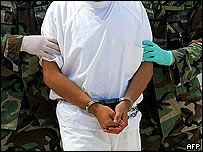
Secrecy surrounds US "war on
terror" prisoner transfers
|
Spain is launching an investigation into claims that CIA planes
carrying terror suspects made secret stopovers on Spanish soil.
Interior Minister Jose Antonio Alonso made the
announcement on Spanish television on Tuesday.
He said that if proven, such activities could damage
relations between the Spanish and US governments.
According to Spanish press reports, the CIA is
suspected of having used Majorca for such prisoner transfers.
"If it were confirmed as true, we would, of
course, be looking at very serious cases," Mr Alonso told the private
channel Telecinco.
The suspect flights - 10 in total - came to light in
a report submitted by Spain's Civil Guard to the prosecutor's office of
the Balearics Supreme Court in June, Spain's El Pais newspaper reported.
The first flight allegedly landed in Palma, on the
island of Majorca, on 22 January 2004.
The suspect flights - by two Boeing 747s and two Gulfstream jets -
allegedly continued until 17 January 2005.
MEPs concerned
Meanwhile, members of the European Parliament have
urged the European Commission to investigate claims that the CIA used
prisons in eastern Europe for the interrogation of terror suspects.
Spain's Defence Minister Jose Bono reacted
cautiously to the Majorca allegations on Tuesday, saying "we do not
have any evidence, we do not have any proof".
He denied a report that the Spanish secret service
had asked the CIA to stop using the airport at Palma.
The flight destinations from Majorca allegedly
included Libya, Algeria, Romania, Macedonia and Sweden, Spanish media
reported.
Spain's relations with the US cooled when Prime
Minister Jose Luis Rodriguez Zapatero withdrew Spain's contingent of
troops from Iraq shortly after taking office in March 2004.
The Popular Party of Jose Maria Aznar, who had
backed the US-led war in Iraq, was ousted in the election, just days after
the 11 March train bombings in Madrid, which left 191 people dead.
|
------------------------------------------------------------------------------------------
http://www.aljazeeramagazine.com/cgi-bin/review/article_full_story.asp?service_ID=10054
U.S. media hides evidence of torture
The U.S. media is ignoring the torture carried by
U.S. military forces. Although the military reports provide a full description
of the suffering the prisoners face, the U.S. media refuses to tackle the issue.
Prisoners are tortured to death under the supervision of the U.S. forces.
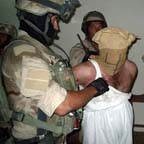 The
U.S. Army has tortured and abused prisoners in Iraq, Afghanistan, and
Guantanamo. The treatment of prisoners in U.S. custody is the ultimate violation
of the international law. Various prisoners have been reported dead as a result
of abuse. Although these reports turn to be true, the soldiers held responsible
don’t get the punishment deserved for such crimes.
The
U.S. Army has tortured and abused prisoners in Iraq, Afghanistan, and
Guantanamo. The treatment of prisoners in U.S. custody is the ultimate violation
of the international law. Various prisoners have been reported dead as a result
of abuse. Although these reports turn to be true, the soldiers held responsible
don’t get the punishment deserved for such crimes.
Moreover, the female soldier involved in Abu Ghraib abuse
scandal in Iraq got imprisoned for six months only.
Some of Guantanamo detainees were sentenced to death
without being interrogated, or sued for their crimes. Others in Afghanistan
faced torture for days and sometimes they are deprived of water and food till
they die.
The following military autopsy was provided by American
Civil Liberties Union (ACLU): "Final Autopsy Report: DOD 003164, (Detainee)
died as a result of asphyxia (lack of oxygen to the brain) due to strangulation
as evidenced by the recently fractured hyoid bone in the neck and soft tissue
hemorrhage extending downward to the level of the right thyroid cartilage".
 "Autopsy
revealed bone fracture, rib fractures, contusions in mid abdomen, back and
buttocks extending to the left flank, abrasions, lateral buttocks. Contusions,
back of legs and knees; abrasions on knees, left fingers and encircling to left
wrist; Lacerations and superficial cuts, right 4th and 5th fingers. Also, blunt
force injuries, predominately recent contusions (bruises) on the torso and lower
extremities. Abrasions on left wrist are consistent with use of restraints. No
evidence of defense injuries or natural disease. Manner of death is homicide.
Whitehorse Detainment Facility, Nasiriyah, Iraq."
"Autopsy
revealed bone fracture, rib fractures, contusions in mid abdomen, back and
buttocks extending to the left flank, abrasions, lateral buttocks. Contusions,
back of legs and knees; abrasions on knees, left fingers and encircling to left
wrist; Lacerations and superficial cuts, right 4th and 5th fingers. Also, blunt
force injuries, predominately recent contusions (bruises) on the torso and lower
extremities. Abrasions on left wrist are consistent with use of restraints. No
evidence of defense injuries or natural disease. Manner of death is homicide.
Whitehorse Detainment Facility, Nasiriyah, Iraq."
According to the ACLU website, on April 5, 2004 a 27
year-old Iraqi prisoner-died while being questioned by Navy Seals, in Mosul, in
Iraq. The autopsy report stated that “hypothermia” is one of the reasons
behind his death. When he was in prison he was exposed to various ways of
torture; he was “hooded, flex-cuffed, sleep deprived and subjected to hot and
cold environmental conditions, including the use of cold water on his body and
hood.”
Another prisoner was reported dead as a result of
“asphyxia and blunt force injuries.” He also died while being questioned by
the U.S. forces.
The ACLU website includes a huge number of reports that
mention in details the torture prisoners face under the U.S. captivity. The
reports include evidence of abuse cases in Iraq and Afghanistan.
Executive Director of ACLU, Anthony Romero, asserted that
the U.S. resort to interrogation methods that cause death for prisoners. ACLU
attorney, Amrit Sing, also said that the ACLU reports are a clear evidence for
the abuses U.S. forces carry out against prisoners while interrogated.
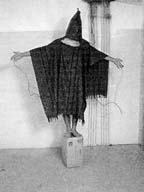 In
April 2003, the ACLU issued a report which stated that Secretary of Defense
Rumsfeld allowed the use of "environmental manipulation" in Guantánamo
Bay “as an interrogation technique.” Moreover, in September 2003, it was
reported that Lt. Gen. Sanchez allowed the use of the same technique in Iraq.
The death of those tortured in Iraq, Guantánamo, and Afghanistan is the
responsibility of high-ranking officials in Bush’s administration.
In
April 2003, the ACLU issued a report which stated that Secretary of Defense
Rumsfeld allowed the use of "environmental manipulation" in Guantánamo
Bay “as an interrogation technique.” Moreover, in September 2003, it was
reported that Lt. Gen. Sanchez allowed the use of the same technique in Iraq.
The death of those tortured in Iraq, Guantánamo, and Afghanistan is the
responsibility of high-ranking officials in Bush’s administration.
The ACLU on October 25, 2005, issued a press release
concerning the deaths of tortured prisoners the U.S. holds. The content of the
report was released after that by The Associated Press and the United Press
International wire services. This allowed the report to be accessible for the
U.S. corporate media. Research proved that 95% of everyday press in U.S.
didn’t pay any attention to the miserable facts in the report.
The Los Angeles Times referred to the report
content as “allegations.” Newspapers such as, Bangor Daily News, Maine,
Telegraph-Herald, Dubuque Iowa, Charleston Gazette, Avocate, Baton Rouge, and
others covered the story. While the Pittsburgh Post-Gazette and the Seattle
Times mentioned some items of the report inside Iraq news stories.
Various news-based websites such as Common Dreams,
Truthout, New Standard, and Science Daily published the ACLU report online.
This shows the very slight attention the U.S. media gave
for the cases of prisoners’ torture. According to prisonplanet.com, “a
Nexus-Lexus search November 30, 2005 of the major papers in the U.S. using the
word torture turned up over 1,000 stories in the last 30 days. None of these
included the ACLU report as supporting documentation on the issue.”
The Americans will not be able to recognize the
seriousness of the torture prisons as long as the U.S. media is ignoring it. The
extent of torture in these prisons has gone beyond the human imagination. The
only source for Americans now to find out about these is the internet because
the U.S. media delivers the news it wants to deliver.
Hiding facts from the American people resulted in them
being accused of sharing the responsibility of what is happening with the U.S.
administration.
------------------------------------------------------------------------------------------
http://www.aljazeeramagazine.com/cgi-bin/review/article_full_story.asp?service_id=10178
| Bush is lying about old deception |
| 11/27/2005 7:40:00 AM
GMT |
The American President seems in a collision course
with his country; with his presidency rolling steadily downhill, as Americans
start to rub sleep away from their eyes, and numerous polls show a sharp decline
in his approval ratings, which have reached an unprecedented level.
Amid raucous debate in Congress about an exit strategy
from Iraq, Americans have become increasingly angry at their President’s
policy. Not only has he deceived his people, Congress and the world about the
reasons for invading Iraq; he is now deceiving them about the deceptions.
“In a burst of political tantrums, the president and the
vice president have shouted that it was 'irresponsible' to assert that there had
been deception and it was unfair to the troops fighting in Iraq”, stated a Chicago
Sun-Times editorial.
Bush’s admin is now lying about its old lies- Bush
misused data to justify Iraq war, and most, if not all of his arguments in the
run up to the war turned out to be false. And his administration’s current
argument that it is "irresponsible" to question the old arguments is
equally false.
“If a lie is a conscious effort to deceive, then the
charge that the president and the men around him deliberately lied and are now
lying again, then that issue must be left to heaven. It is enough to say they
spread falsehoods three years because they had made up their minds that there
had to be a war and are now spreading falsehoods about the original
falsehoods,” the article added.
And because he’s not a man who likes to admit his
mistakes, Bush seeks to cover up the mistakes with new ones, and protect old
lies from uncovering by lying.
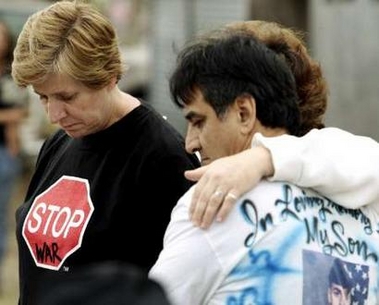 Cindy
Sheehan, mother of Casey Sheehan, an American soldier killed last year in Iraq,
has returned to Crawford, Texas, to resume her anti-war campaign against
President Bush, according to The Associated Press.
Cindy
Sheehan, mother of Casey Sheehan, an American soldier killed last year in Iraq,
has returned to Crawford, Texas, to resume her anti-war campaign against
President Bush, according to The Associated Press.
Sheehan, the mother of a fallen soldier whose vigil
against the war in Iraq outside President Bush's ranch, was greeted by nearly
three-dozen cheering supporters as she arrived at the Waco airport.
The woman stressed that she will "keep pressing"
Bush’s admin until it ends Iraq occupation and brings the U.S. troops back
home.
But many protesters were arrested near the ranch, while
more than 100 continued the protest Wednesday with a symbolic Iraqi meal, and
instead of the usual Thanksgiving feast, they ate salmon, lentils and rice.
"I feel happy to be back here with all my friends ...
but I'm heartbroken that we have to be here again," Sheehan said.
"We will keep pressing and we won't give up until our
troops are brought home."
 Lies
by the American Vice President Dick Cheney and Bush are almost the same- They
both claimed and still claim the former Iraqi regime was trying to import
"yellowcake" uranium for nuclear weapons.
Lies
by the American Vice President Dick Cheney and Bush are almost the same- They
both claimed and still claim the former Iraqi regime was trying to import
"yellowcake" uranium for nuclear weapons.
And contrary to previous claims by the President who
asserted that everyone agreed that Saddam did possess Weapons of Mass
Destruction and that it is not his fault that all the intelligence agencies of
the world believed that he did, many Democratic senators said they disagreed
with Bush’s argument and said that they weren’t realizing how much the case
in favor of the war had been cooked and that the administration created the
atmosphere among the nation to deceive it and win support for the war.
Challenging old lies by the President, who’s trying to
throw the blame on the intelligence agencies, the Democrats now say that not
everyone in Washington supported the war.
Iraq war has been on Bush’ agenda even before September
11 attacks on the United States in 2001. More than four years ago and before the
attacks took place, the administration leaders, Cheney, Rumsfeld, and Wolfowitz
sought a war with Iraq, with some trying to come up with evidence that Iraq was
in one way or another connected to Al Qaeda network, which allegedly carried out
the attacks.
Everyone was trying to find evidence.
Then-National Security Adviser Condoleezza Rice and the
vice president warned of "mushroom clouds."
Not only did the President deliberately lie to his people,
he nonetheless presided over what was in effect and in truth a massive
deception.
He would have gained his nation's and world’s respect if
he just admitted his mistakes and assume responsibility, but it seems he’s not
prepared or willing to do so.
About three-fifths of Americans now believe their
President did in fact deceive them. And lying didn’t stop at launching Iraq
war, Bush and Donald Rumsfeld, the Defense Secretary are now spreading more lies
and deceiving the people about the reality of what’s going in Iraq, claiming
that the U.S. military is achieving great successes in the country, and that
everything is now under the control of the U.S. military
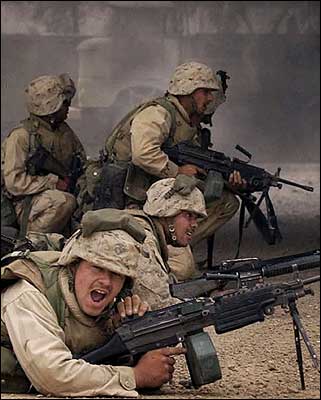 Another
lie is that the U.S.-led occupation forces won’t leave Iraq now to make sure
the country’s own forces and army are ready to handle its security, and that
once the Army is done with the training of the Iraqi forces, they’ll withdraw
immediately, but of course we are not told how long that will take- Why
after several years of that effort is there only one fully capable Iraqi unit
(of 750 men)?
Another
lie is that the U.S.-led occupation forces won’t leave Iraq now to make sure
the country’s own forces and army are ready to handle its security, and that
once the Army is done with the training of the Iraqi forces, they’ll withdraw
immediately, but of course we are not told how long that will take- Why
after several years of that effort is there only one fully capable Iraqi unit
(of 750 men)?
Despite Cheney and Bush’s recent rhetoric and speeches
rejecting the Democrats’ calls for an immediate withdrawal from the war-torn
country, U.S. commanders have already started plans to close bases and withdraw
troops in the coming year, according to two congressmen who returned from Iraq
this week.
"They wouldn't put a hard date on it, but clearly the
planning is at a very mature level," Rep. John Kline, R-Minn., said.
"We can shrink down the number of bases as we shrink down the number of
Americans."
Also Rep. Mark Kennedy, R-Minn., said that in some Iraqi
cities the turnover is already in progress. "They have a planned turnover
process where American troops have already pulled back from some of the smaller
bases.
------------------------------------------------------------------------------------------
http://www.aljazeeramagazine.com/cgi-bin/review/article_full_story.asp?service_id=10040
Evidence of “U.S. suspects
facing torture in Europe”
It is no secret that the United States runs secret
detention centers around the world, and not just Asia and Africa, but in
European countries as well.
It sends its suspects “overseas”, a process known as
"rendition", for the interrogation and probably to face torture and
abuse.
This process has become increasingly controversial with
mounting evidence that prisoners are subject to torture in those countries,
according to orders laid by the U.S. State Department.
The treatment of prisoners in those camps, including
Guantanamo Bay in Cuba, has come in for intense scrutiny and evidence of human
rights violations has been widely reported.
“Two flights chartered by the CIA made stopovers in
France in 2002 and 2005, French newspaper Le Figaro said Friday,”
according to San Francesco Independent Media center.
The first flight stopped over in March 31, 2002. According
to Le Figaro, the second flight stopped near Paris on July 20, 2005, arriving
from Norway.
As mentioned in Le Figaro, “the Canadian
security authorities are also investigating this Learjet's comings and
goings.”
The first stopover was said to be a result of the
“limited range of this twin-engine 6/8 seater,” because the flight can’t
take the journey one way between Guantanamo and Turkey.
The Guipavas airport authorities told Le Figaro
that the crew was alone on board, and after Brest they will be on their way to
Rome for another stopover.
The second jet belonged to the CIA. “Gulfstream III,
with the serial number N50BH, landed at Paris Le Bourget airport at 1922 hours,
from Oslo Gardemoein,” according to the Norwegian daily.
Usually the U.S. jets are received by Aeroservices
“which is located near the Air and Space Museum.” However, this jet was
received by a “Service Company based in a more discreet area.”
This twin-engine jet landed 10 times in Canada and six
times in Guantanamo. Unlike the first one, this jet can cross the Atlantic
without stopping.
CIA jets can stop over without prior knowledge of France's official services.
CIA flights can go over France and other countries without giving any details
about the trip or even acknowledging the airport authorities that it will pass
or stopover.
Foreign Ministry spokesman, Jean-Baptiste Mattei, said
“the government has considered the question of the transit through French
territory of suspect aircraft.” He then added that the authorities have “no
evidence of such landings.”
France is a middle point at which the CIA “prison jet”
passes though during its journeys. This journey is preferred to be over the
lands of the U.S. allies. The lands which they have military bases.
Reports published by The New York Times and The
Guardian provide those facts, “over 300 flights landed in Europe between
November 2001 and August 2005. Germany is in the lead, with at least 94 recorded
flights, followed by Britain (at least 76), the Czech Republic (15), Spain (15),
and Greece (13).”
European governments’ believe that these flights might
have Muslim prisoners whom the U.S. wants to interrogate away from the
supervision of the international law.
The United States promised on Wednesday December, 2 to
provide the EU on this issue an "opportune" and "direct"
response.
Home
About us Comments
Webmaster Links
Books To Read Movies
Archives Blog
Shop

 Iraq
and Afghanistan wars are the initial events in a scenario which will eventually
develop into a third world war. What we see in the actions of Bush, Cheney,
Rumsfeld, Perle, Wolfowitz and others is the same sort of greed and madness that
drove the Nazis to attack Austria and Czechoslovakia, and later Poland, France
and other countries during World War II.
Iraq
and Afghanistan wars are the initial events in a scenario which will eventually
develop into a third world war. What we see in the actions of Bush, Cheney,
Rumsfeld, Perle, Wolfowitz and others is the same sort of greed and madness that
drove the Nazis to attack Austria and Czechoslovakia, and later Poland, France
and other countries during World War II.


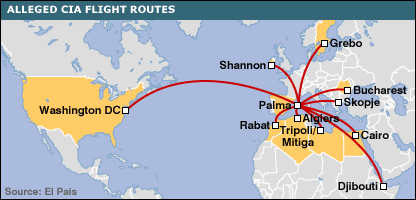
 The
U.S. Army has tortured and abused prisoners in Iraq, Afghanistan, and
Guantanamo. The treatment of prisoners in U.S. custody is the ultimate violation
of the international law. Various prisoners have been reported dead as a result
of abuse. Although these reports turn to be true, the soldiers held responsible
don’t get the punishment deserved for such crimes.
The
U.S. Army has tortured and abused prisoners in Iraq, Afghanistan, and
Guantanamo. The treatment of prisoners in U.S. custody is the ultimate violation
of the international law. Various prisoners have been reported dead as a result
of abuse. Although these reports turn to be true, the soldiers held responsible
don’t get the punishment deserved for such crimes. "Autopsy
revealed bone fracture, rib fractures, contusions in mid abdomen, back and
buttocks extending to the left flank, abrasions, lateral buttocks. Contusions,
back of legs and knees; abrasions on knees, left fingers and encircling to left
wrist; Lacerations and superficial cuts, right 4th and 5th fingers. Also, blunt
force injuries, predominately recent contusions (bruises) on the torso and lower
extremities. Abrasions on left wrist are consistent with use of restraints. No
evidence of defense injuries or natural disease. Manner of death is homicide.
Whitehorse Detainment Facility, Nasiriyah, Iraq."
"Autopsy
revealed bone fracture, rib fractures, contusions in mid abdomen, back and
buttocks extending to the left flank, abrasions, lateral buttocks. Contusions,
back of legs and knees; abrasions on knees, left fingers and encircling to left
wrist; Lacerations and superficial cuts, right 4th and 5th fingers. Also, blunt
force injuries, predominately recent contusions (bruises) on the torso and lower
extremities. Abrasions on left wrist are consistent with use of restraints. No
evidence of defense injuries or natural disease. Manner of death is homicide.
Whitehorse Detainment Facility, Nasiriyah, Iraq." In
April 2003, the ACLU issued a report which stated that Secretary of Defense
Rumsfeld allowed the use of "environmental manipulation" in Guantánamo
Bay “as an interrogation technique.” Moreover, in September 2003, it was
reported that Lt. Gen. Sanchez allowed the use of the same technique in Iraq.
The death of those tortured in Iraq, Guantánamo, and Afghanistan is the
responsibility of high-ranking officials in Bush’s administration.
In
April 2003, the ACLU issued a report which stated that Secretary of Defense
Rumsfeld allowed the use of "environmental manipulation" in Guantánamo
Bay “as an interrogation technique.” Moreover, in September 2003, it was
reported that Lt. Gen. Sanchez allowed the use of the same technique in Iraq.
The death of those tortured in Iraq, Guantánamo, and Afghanistan is the
responsibility of high-ranking officials in Bush’s administration. Cindy
Sheehan, mother of Casey Sheehan, an American soldier killed last year in Iraq,
has returned to Crawford, Texas, to resume her anti-war campaign against
President Bush, according to The Associated Press.
Cindy
Sheehan, mother of Casey Sheehan, an American soldier killed last year in Iraq,
has returned to Crawford, Texas, to resume her anti-war campaign against
President Bush, according to The Associated Press. Lies
by the American Vice President Dick Cheney and Bush are almost the same- They
both claimed and still claim the former Iraqi regime was trying to import
"yellowcake" uranium for nuclear weapons.
Lies
by the American Vice President Dick Cheney and Bush are almost the same- They
both claimed and still claim the former Iraqi regime was trying to import
"yellowcake" uranium for nuclear weapons. Another
lie is that the U.S.-led occupation forces won’t leave Iraq now to make sure
the country’s own forces and army are ready to handle its security, and that
once the Army is done with the training of the Iraqi forces, they’ll withdraw
immediately, but of course we are not told how long that will take- Why
after several years of that effort is there only one fully capable Iraqi unit
(of 750 men)?
Another
lie is that the U.S.-led occupation forces won’t leave Iraq now to make sure
the country’s own forces and army are ready to handle its security, and that
once the Army is done with the training of the Iraqi forces, they’ll withdraw
immediately, but of course we are not told how long that will take- Why
after several years of that effort is there only one fully capable Iraqi unit
(of 750 men)?